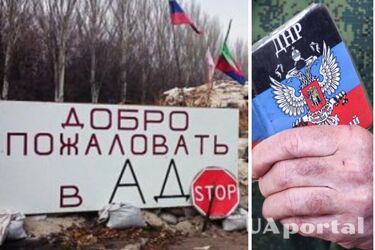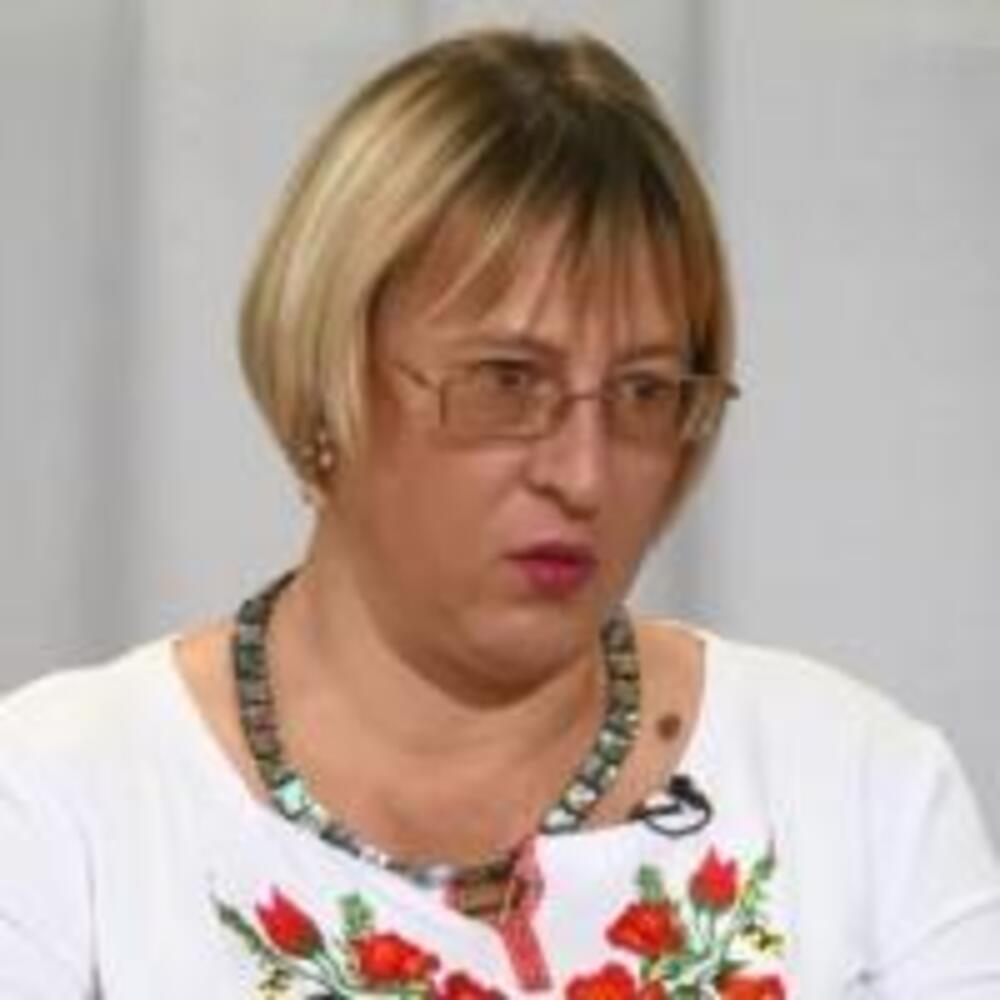Under Russian occupation, Donbas has lost its future

BLOG
What is happening now in ORDLO can be called a "slow death". It's as if the veins of this land and these cities have been cut and they are dying quietly and slowly, watching the blood flow from their veins. And next to them, their inhabitants sit like crows. What are they waiting for, why don't they stop the blood, why don't they save their cities, and you want to scream when you look at the photos from your once native land. But instead of saving them, people are repeatedly cutting their arms, veins, and veins of their cities with a sharp blade, not giving them a chance to live.
The occupied cities, let me remind you that in ORDLO they are called "liberated", have long lost their thirst for life. They no longer shine with freshness and beauty, their breath has long smelled of decay, not the wind that was once infused with steppe grasses. This land looks like a zombie in a horror movie. A kind of dead man who no longer feels anything, moving around somehow, whose only desire is to kill, maim, and turn everything he touches into zombies.
10 years of war, 10 years of occupation.
February 20, 2014, is the beginning of the Russian-Ukrainian war, but Donbas is unlikely to understand this date. This is the date of the occupation of Crimea. The war came to Donbas a little later, on March 1, 2014. These are already tricolors, rallies, open speeches of the critical majority of people "Donbas-Russia". And most importantly, on March 1, 2014, the State Duma of the Russian Federation voted to send Russian troops into Ukraine. The Council of the Russian Federation granted Putin's request to send troops into the territory of the neighboring state. The decision was made unanimously and came into force. The Russia 24 TV channel broadcast live from the extraordinary session of the upper house of parliament. It was a celebration.
People, not all of them, but a critical majority of residents of Luhansk and Donetsk oblasts, were hugging each other, congratulating each other on their "liberation," rejoicing, dreaming.
At that time, almost all cities in Donbas held rallies for Ukraine, unity rallies, and protests against the occupation. It was very dangerous because we were a minority. People had already begun to kill for the yellow and blue, for the language, for Ukraine, clearing the way for the tricolor and dreams of "living in Russian." It's hard to remember this. It's incredibly hard and painful. I still remember this feeling of helplessness when you are a hostage to the critical majority of people and their dreams.
Back then, in my blog "Everything will be Ukraine," I described this state as "I feel like I'm living in a horror movie, you're walking through the city, everyone has already been bitten, and you haven't been bitten yet." That's exactly how I felt at the time. Everyone is happy, rejoicing, and you are crying because you realize that this is the beginning of the end.
I don't know why, I clearly understood that the war would be long, I clearly understood that Russia would destroy Donbas, but the rear border towns that first saw Russian tanks and "liberators" would die very slowly. Russia would not destroy them until it completely retreated from our territory, but the "living in Russian" that the critical majority of Ukrainian borderland residents dreamed of would be poison, a knife that would cut the veins and let life out of this doomed land.
I made a mistake only in the timing, because I wrote that the war would last for 10 years and Ukraine would become a second Afghanistan for Russia, bringing Russia a large number of dead, sanctions, economic destruction and the disintegration of the Russian Federation into independent entities. For 10 years now, the war has been going on, and the first signs of decline have only appeared in Russia, and then only in a few social sectors: pharmaceutical, agricultural, textile, and automotive. But the Kremlin has never cared about the lives and social situation of ordinary Russians, so all the money is simply redirected to military needs, and the people are already used to living in a dung heap, so they are not given any more.
I read about the indignation of the residents of the Russian city of Bratsk, where an advertisement "Russia is the world leader in gas production" was installed, because the city is freezing, heated by a coal boiler and does not have gas supply, like most cities in Russia. This is how Russians live, unnecessary to their government, which is playing at world domination.
It is interesting that the cities and towns of Donbas "oppressed by the Kyiv junta," including those much smaller than Bratsk, are gasified. They used to be. Until Russia came to "liberate" them. Now, in most cities and towns of the ORDLO, things are just like in Russia: no electricity, no gas, no coal, no roads, no internet, no hospitals. Instead, there are huge piles of garbage and stench everywhere. Cockroaches in apartments, hospitals and schools. Bedbugs and lice, infectious diseases and lack of doctors.
And now, when I read the news from the ORDLO about another closed hospital or another closed enterprise, I wonder why I knew it would happen, and why people who, like me, lived all their lives in the borderland, had a vivid example of life in the Russian hinterland, had almost the same education as me, but believed that someone would make their lives like in a fairy tale with milk rivers and jelly shores.
I wonder whether Donbas residents would have come out to the rallies "with Russia in their hearts" in such large numbers if they knew what Russia would do to them. I think they would have come out because they didn't believe it. They did not believe us, who said that this is exactly what would happen. Everything we said, warned, vanguarded, and cajoled, a critical majority of Donbas residents in 2014 called Ukrop propaganda.
Now they are living in this very "propaganda": without electricity, gas, coal, hospitals, water, dying with their families, burying loved ones and mourning the enterprises that the occupiers are cutting for metal.
This year is a difficult winter for ORDLO. In terms of severity and mortality, such a winter was only during the Covid period, when more than 25% of the population died without medicines and professional help. Currently, the situation in ORDLO is in tatters due to severe weather conditions. 63% of the population has been without electricity since December, and many schools have been switched to remote learning. There is no water, no heating, no medicine, no money. People are dying of hunger and cold. Food is not being delivered to remote villages where buses and minibuses used to go under the junta, and they have simply forgotten about medicines and doctors.
The so-called "Ministry of Fuel and Energy" vigorously reports that they managed to restore heat and electricity to 1557 houses in a day, but for some reason, power engineers report an increase in the number of residents left without electricity. On social media, people are outraged that everything in the 'people's republic' is for the people, and that the power company has set a fee for repairs and repairs only those streets or houses that have paid the money.
A few days ago, 4 containers of garbage were taken out of Dovzhansk (ORLO, Luhansk region, occupation). It was filmed on TV as an incredible miracle, a holiday, a "breakthrough of the year". Well, at least without an orchestra and a priest, because there were precedents. People write with sadness that the region is turning into a garbage dump, everything is ruined, destroyed, and there is no future.
A beggar's town - this is the assessment given by the citizens of Dovzhansk. And it is true. The garbage is piled up, and as soon as it gets warmer, very smelly rivers of manure and urine will flow here.
The only infirmary in the town is being closed, in addition to the already closed infectious disease hospital, tuberculosis and skin and venereal disease clinics. The bakery was closed. There is only one in Luhansk, like the hospitals. So, like bad weather, bread is simply not delivered.
What is happening now in ORDLO can be called "slow death". The occupiers are slowly destroying this region. They are populating it with Buryats and Yakuts, Tuvans and Dagestanis. They are littering it with garbage, and Russia plans to open 4 large landfills near Dovzhansk. Just think about it: 4 landfills on the site of protected steppes.
How does it feel to live in a "people's republic" without a "hunta" or "bandera"? But most of those who rejoiced at the "liberation" in 2014 are already dead. They will not answer. And those who are alive are simply adjusting to the conditions, whispering "it won't get worse," dreaming "maybe it will get better," waiting "we are about to defeat Ukraine and live" and quietly leaving the "republic" to vacate houses for settlers from Tyva and Yakutia.

